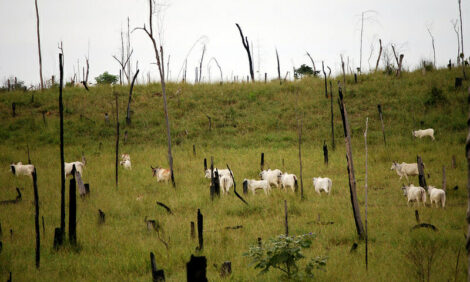



Drought to Affect Livestock Water Supplies
UK - Drought in the UK is already preventing water abstraction affecting crop farmers, however the Environment Agency has warned that things are going to get worse, with grass growth limited and water shortages which could affect supplies of drinking water for livestock.The Environment Agency’s Drought Prospects report, published yesterday (12 March), warns that the drought could spread as far north as East Yorkshire and as far west as the Hampshire –Wiltshire border, if the dry weather continues this spring. The whole of the south east and east Anglia are already in drought.
The report states that prolonged dry weather in parts of England over autumn and winter has resulted in restrictions on summer and winter abstraction, soil compaction and bare ground.
Livestock
In some places grass growth has been limited resulting in some farmers having to bring livestock indoors and using winter stores and supplementary feed. This in turn has meant certain areas such as the West Midlands have had low forage stocks for winter 2011/12, which has created high forage prices - grass seed prices have increased by £20 per acre.
It is likely that the quality of grass will continue to decrease, resulting in either more expense for farmers re-seeding or reductions in livestock numbers as there is less grass to feed livestock. Limited grass growth could lead to water quality issues as nutrients are washed directly into watercourses due to the lack of absorption by plants.
Continued dry weather could also increase risks to supplies of drinking water for livestock, particularly housed pigs and poultry. The Environment Agency and NFU are working with water companies to ensure there are emergency plans in place for this eventuality.
Water Abstraction Limited
Across central, east and south east England some farmers have been, and still are, prevented from abstracting water. This is very unusual for the time of year. For example, in eastern England over winter there were 106 licences with restrictions out of a total of 911 licences for winter storage filling for spray irrigation. The majority of the licences affected were for spray irrigation winter storage reservoirs.
The Environment Agency has been working with the NFU and farmers to inform them quickly when they are able to take advantage of high flows. The majority of winter storage reservoirs will be full before spring.
"We recognise the problems farmers face this spring and summer where they have not been able to fill their reservoirs. To help them we have introduced a number of changes they can consider to help fill their reservoirs. These are to reduce the cost of taking high flows in summer, increasing their pump rates to fill reservoirs faster, relaxing certain hands off flow conditions in abstraction licences and extending the abstraction season. When implementing these actions we have given careful consideration to the impacts on the environment."
Spray Irrigation
Those farmers relying on refill of winter storage reservoirs to the normal levels to irrigate crops later in the year, will be hit hard. Spray irrigation prospects currently look much less favourable for this time of year than they have for several years, particularly in East Anglia.
Drought management actions, such as hands off flow restrictions and section 57 irrigation bans, are probable throughout parts of central, east, south east and south west England particularly if there is below average rainfall over the coming months. Some eastern areas of the Wye catchment may start the spring at lower than normal river levels and could see low flows in the summer.
The report calls on water companies to follow their drought plans, show that they are reducing leakage from their networks, consider sharing water with neighbouring companies, and encourage their customers to use water wisely now, which will put them in a better position for the summer.
National Farmers Union (NFU) urges farmers to conserve water
NFU Deputy President Meurig Raymond said: “Farmers and growers take water management extremely seriously. It is good to see that constructive dialogue between water companies, the EA, government and farmers, as well as better forward planning, has ensured that water resources have been available for essential uses such as food production.
“Most agricultural production in England and Wales is rain-fed, with only one per cent of water resources nationally being taken from ground and surface water sources for agricultural use. The NFU is now discussing with water companies how drinking water will continue to be made available for livestock and with the EA on how restrictions on crop irrigation could be phased in to allow advance planning and use of voluntary restrictions wherever possible.
“People need to realise that there is no quick fix to this issue. Increasing investment in on-farm water storage capacity will be vital going forward. To that end the NFU would urge to reinstate the tax relief for the cost of farm reservoirs in next week’s Budget.”
The Environment Agency is also advising farmers to look for ways to share water resources by setting up water abstractor groups and to take steps now to improve water efficiency.
Further Reading
| - | You can view the full report by clicking here. |
TheCattleSite News Desk


